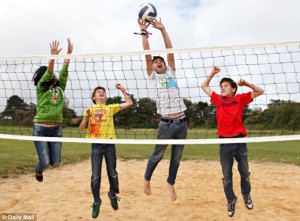Sunday Times 2
Want your child to do well at school? Make them play outside
laying outside and going on sightseeing trips can boost the chances of children suceeding in the classroom, a new report revealed this week.
Children who spend more time in less structured activities — from playing outside to reading books and visiting the zoo — are better able to set their own goals and take actions to meet those goals without prodding from adults, according to the University of Colorado at Boulder, study.

Children who spend more time doing less structured activities will be more successful in the classroom as they will be better at setting their own goals, switching between activities and controlling their moods. Pic © Daily Mail
It also found that children who participate in more structured activities –including soccer practice, piano lessons and homework — had poorer ‘self-directed executive function,’ a measure of the ability to set and reach goals independently.
CU-Boulder psychology and neuroscience Professor Yuko Munakata said: ‘Executive function is extremely important for children.
‘It helps them in all kinds of ways throughout their daily lives, from flexibly switching between different activities rather than getting stuck on one thing, to stopping themselves from yelling when angry, to delaying gratification. Executive function during childhood also predicts important outcomes, like academic performance, health, wealth and criminality, years and even decades later.’
The study is one of the first to try to answer the question of how an increase in scheduled, formal activities may affect the way children’s brains develop.
Mr Munakata said a debate about parenting philosophy – with extremely rigid ‘tiger moms’ on one side and more elastic ‘free-range’ parents on the other – has played out in the media and on parenting blogs in recent years. But there is little scientific evidence to support claims made by either group.
Jane Barker, who led the study, said: ‘These are societally important questions that come up quite often in social commentary and casual conversations among parents. So it’s important to conduct research in this area, even if the questions are messy and not easy to investigate.’
© Daily Mail, London

